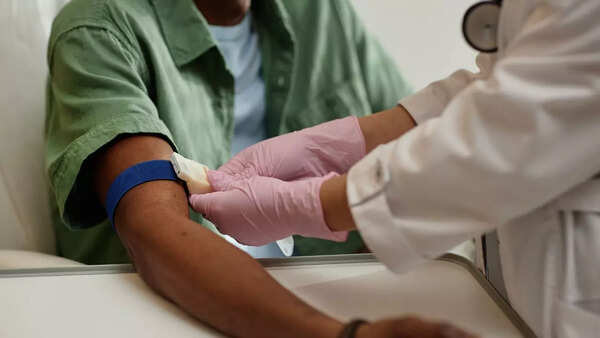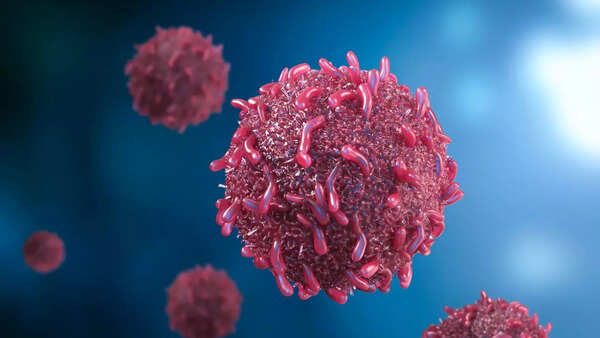One of the leading causes of death in recent years, cancer, is claiming to take millions of lives each year. Despite the significant advancements in the treatment, the biggest challenge in fighting cancer is that the detection is often too late. Detecting cancer earlier may dramatically improve survival rates and offer more treatment options. But, this is yet harder to diagnose at the earliest stage and is one of the crucial reasons for rising deaths worldwide. Now, a new study by Johns Hopkins University researchers suggests that a simple blood test could help identify cancer years before symptoms even begin to show, potentially transforming the future of early diagnosis and prevention.According to the study published in the peer-reviewed journal Cancer Discovery, this breakthrough might be a push in early diagnosis of cancer.
A simple blood test may detect cancer early, before any symptoms start
Cancer outcomes are heavily dependent on how early the disease is detected. When tumours are caught in their initial stages, they tend to be smaller, less aggressive, and more responsive to treatment. As researcher Yuxuan Wang from Johns Hopkins explains, “Three years earlier provides time for intervention. The tumours are likely to be much less advanced and more likely to be curable.”This time advantage could make the difference between curable and life-threatening cancer, especially in aggressive forms of the disease.At the heart of the research is a type of genetic material called circulating tumour DNA (ctDNA). Tumours naturally shed fragments of their DNA into the bloodstream, but these traces are extremely minute and hard to detect, especially in the early stages.

Science behind detecting cancer in blood
To identify these fragments, scientists used multi-step algorithms and cross-checks to scan blood samples for modifications in DNA patterns that are commonly linked to tumours. The technique forms the basis of a Multi-Cancer Early Detection (MCED) test, designed to look for cancer-specific genetic changes in the blood.The research team analysed blood samples from 52 individuals, split into two groups:
- 26 people who were later diagnosed with cancer within six months of sample collection.
- 26 people who remained cancer-free.
When subjected to the MCED test, eight cancer cases were flagged, indicating a 31% detection rate. While not perfect, this detection occurred before any formal diagnosis or visible symptoms appeared.

Testing the method: What the study revealed
What makes the findings even more groundbreaking is the analysis of older blood samples from some of the participants. Six of the eight individuals who were detected by the MCED test had blood samples available from 3.1 to 3.5 years before their diagnosis.Amazingly, cancer signals were found in four of those six samples. The ctDNA was present, although at levels up to 80 times lower than what the current test threshold requires. This suggests that tumours begin shedding DNA into the blood long before symptoms arise. if the tests are sensitive enough, these early signs could be caught. While the results are promising, they also highlight a key hurdle that the current technology needs to improve its sensitivity. The earlier the stage of cancer, the lower the ctDNA levels, making detection difficult.“This study shows the promise of MCED tests in detecting cancers very early,” says Dr. Bert Vogelstein, a senior cancer researcher involved in the project. “But it also sets the benchmark sensitivities required for these tests to succeed.” In simpler terms, we now know what we should aim for—but we’re not quite there yet.
What happens after a positive cancer blood test
Even though the science is encouraging, moving from lab to the clinic is not straightforward. Blood-based cancer screening tests must undergo rigorous clinical trials to prove their reliability and safety. Once proven effective, they still require regulatory approvals before being adopted into regular medical practice. There’s also the question of what comes after a positive test. Dr. Nickolas Papadopoulos from the Ludwig Centre notes, “We need to determine the appropriate clinical follow-up after a positive test result. That includes further scans, biopsies, or even preventive treatments.”

Despite the current limitations, this research represents a hopeful shift in cancer diagnostics. Combined with ongoing advances in treatment, especially therapies targeting multiple cancer types, the future holds the potential for significantly improved survival rates. This could mark a revolutionary step forward in how cancer is screened and treated.Also Read | 10 common monsoon diseases that might cause serious health problems; know symptoms and how to protect yourself
var _mfq = window._mfq || [];
_mfq.push([“setVariable”, “toi_titan”, window.location.href]);
!(function(f, b, e, v, n, t, s) {
function loadFBEvents(isFBCampaignActive) {
if (!isFBCampaignActive) {
return;
}
(function(f, b, e, v, n, t, s) {
if (f.fbq) return;
n = f.fbq = function() {
n.callMethod ? n.callMethod(…arguments) : n.queue.push(arguments);
};
if (!f._fbq) f._fbq = n;
n.push = n;
n.loaded = !0;
n.version = ‘2.0’;
n.queue = [];
t = b.createElement(e);
t.async = !0;
t.defer = !0;
t.src = v;
s = b.getElementsByTagName(e)[0];
s.parentNode.insertBefore(t, s);
})(f, b, e, ‘https://connect.facebook.net/en_US/fbevents.js’, n, t, s);
fbq(‘init’, ‘593671331875494’);
fbq(‘track’, ‘PageView’);
};
function loadGtagEvents(isGoogleCampaignActive) {
if (!isGoogleCampaignActive) {
return;
}
var id = document.getElementById(‘toi-plus-google-campaign’);
if (id) {
return;
}
(function(f, b, e, v, n, t, s) {
t = b.createElement(e);
t.async = !0;
t.defer = !0;
t.src = v;
t.id = ‘toi-plus-google-campaign’;
s = b.getElementsByTagName(e)[0];
s.parentNode.insertBefore(t, s);
})(f, b, e, ‘https://www.googletagmanager.com/gtag/js?id=AW-877820074’, n, t, s);
};
function loadSurvicateJs(allowedSurvicateSections = []){
const section = window.location.pathname.split(‘/’)[1]
const isHomePageAllowed = window.location.pathname === ‘/’ && allowedSurvicateSections.includes(‘homepage’)
const ifAllowedOnAllPages = allowedSurvicateSections && allowedSurvicateSections.includes(‘all’);
if(allowedSurvicateSections.includes(section) || isHomePageAllowed || ifAllowedOnAllPages){
(function(w) {
function setAttributes() {
var prime_user_status = window.isPrime ? ‘paid’ : ‘free’ ;
var geoLocation = window?.geoinfo?.CountryCode ? window?.geoinfo?.CountryCode : ‘IN’ ;
w._sva.setVisitorTraits({
toi_user_subscription_status : prime_user_status,
toi_user_geolocation : geoLocation
});
}
if (w._sva && w._sva.setVisitorTraits) {
setAttributes();
} else {
w.addEventListener(“SurvicateReady”, setAttributes);
}
var s = document.createElement(‘script’);
s.src=”https://survey.survicate.com/workspaces/0be6ae9845d14a7c8ff08a7a00bd9b21/web_surveys.js”;
s.async = true;
var e = document.getElementsByTagName(‘script’)[0];
e.parentNode.insertBefore(s, e);
})(window);
}
}
window.TimesApps = window.TimesApps || {};
var TimesApps = window.TimesApps;
TimesApps.toiPlusEvents = function(config) {
var isConfigAvailable = “toiplus_site_settings” in f && “isFBCampaignActive” in f.toiplus_site_settings && “isGoogleCampaignActive” in f.toiplus_site_settings;
var isPrimeUser = window.isPrime;
var isPrimeUserLayout = window.isPrimeUserLayout;
if (isConfigAvailable && !isPrimeUser) {
loadGtagEvents(f.toiplus_site_settings.isGoogleCampaignActive);
loadFBEvents(f.toiplus_site_settings.isFBCampaignActive);
loadSurvicateJs(f.toiplus_site_settings.allowedSurvicateSections);
} else {
var JarvisUrl=”https://jarvis.indiatimes.com/v1/feeds/toi_plus/site_settings/643526e21443833f0c454615?db_env=published”;
window.getFromClient(JarvisUrl, function(config){
if (config) {
const allowedSectionSuricate = (isPrimeUserLayout) ? config?.allowedSurvicatePrimeSections : config?.allowedSurvicateSections
loadGtagEvents(config?.isGoogleCampaignActive);
loadFBEvents(config?.isFBCampaignActive);
loadSurvicateJs(allowedSectionSuricate);
}
})
}
};
})(
window,
document,
‘script’,
);
#Cancer #detected #years #symptoms #simple #blood #test #study #reveals



